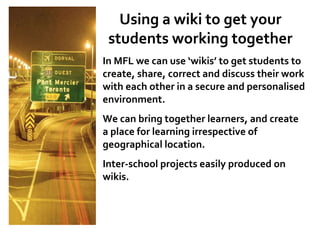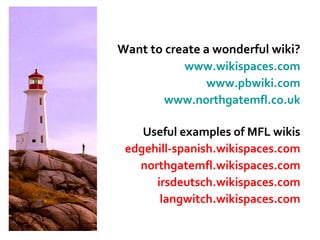Building wikis 2011 ililc
- 1. A guide to using Wikis in MFL Collaboration, Creativity, Motivation Alex Blagona Language College Coordinator Northgate High School, Ipswich 13 th February 2011 northgatemfl.wikispaces.com alexblagona.blogspot.com [email_address]
- 2. Keeping up with the kids? Playing catch-up – a necessity Embracing students’ know-how Showing them the tools
- 3. Connectivity Global Learning Authenticity Confidence Relevance Inspiration Collaboration Motivation Interactivity Creativity 21 st Century language learning should involve… Engagement Enjoyment
- 4. Can wiki-technology fit the bill? Easy to set-up website. Allows students to come together and work. Students can create and design their own pages. Add and embed media-rich content. Connected = motivated! Content for a purpose.
- 5. Promotes independent study and research skills. Makes MFL more relevant to kids – real communication! It’s quite simple to use. Allows work to be published openly, or to a select audience. Allows for peer assessment in a safe environment - assessment for learning. Very few restrictions that can hinder students creativity. You can include lots of interactive tools (Widgets!) It’s FREE for educators.
- 6. Ã˝
- 7. Better than a VLE? Not necessarily better, just different! A wiki is ideal for class projects. A closer community, working together. Allows contributors control over the page. Easier to maintain than a VLE. Not as ‘clunky’. Facilitates collaboration across institutions .
- 8. What makes wikis remarkable? Anyone can add, edit, or delete a page. Users control the design and organisation of the wiki. What you write is more important than how it looks. A bridge between 20 th and 21 st Century learning.
- 9. Keeping it simple! All changes are to all pages are recorded. Access can be restricted or opened up. Each page has a discussion page. Any mistakes (or acts of vandalism!) can be quickly undone!
- 10. Wiki as a collaboration tool Students like being able to collaborate. Successful wikis are run by the students, but monitored by the teachers. Allows more able students to actively support the less able in the same group. Differentiated tasks enable everyone to contribute. Students need to develop wiki-skills - but it is a great way to aid independent study. The “history” and “recent changes” tools help with assessing participation
- 11. What to consider when starting a wiki? Purpose Audience Content Short term project? Or long term resource? One class? One subject? One school? Teacher created resources? Student work?
- 12. Reaching out to people… Sharing good ideas and resources. Raising awareness of MFL across the school (and beyond!) Getting students to assess each other’s work. Giving students an opportunity to be creative!
- 13. Wiki as information pool/resource Students can create learning materials! Wikis allow a variety of authorship/ownership combinations. Wikis break down the dynamics of traditional writing assignments. Gives learners ownership of resources and contributions. Wikis can expand both the audience and the participants in writing projects. Plagiarism can be an issue, but shouldn’t be!
- 14. Using a wiki to get your students working together In MFL we can use ‘wikis’ to get students to create, share, correct and discuss their work with each other in a secure and personalised environment. We can bring together learners, and create a place for learning irrespective of geographical location. Inter-school projects easily produced on wikis.
- 15. OUR VERY FIRST PAGE! Welcome to the Y12 French 'wiki'. A wiki is a web page that anyone can edit or change. What is the point of having one? Well, not only is learning French about what you can pick up in lessons, it's also about being able to learn from each other. That does not mean copying, but it means working together and helping each other, and sharing ideas, so that we ALL can learn from each other. For the next week or two these pages will be open so that anyone can use them, but when you get the hang of it, I'll secure them so that they are yours and can't be messed up. In the next few weeks we'll be using the wiki to do a few things as a group. It might be preparing a debate, analysing a text - why spend all night looking up every word when if we divide it up into sections it can be done a lot quicker!
- 16. Ã˝
- 17. “ What I like best about the Wiki” “ The chance to be creative was great - and it’s better than just writing it - we could put whatever we wanted on there (pictures, responses, content).” “ I like to see my classmates’ work. It was also fun to see [their] comments on my work.” “ Seeing some of the phrases used in people’s essays made me want to make my essay better.” “ It gives you a chance to feel part of a group - we can learn from the rest of the group - and it makes sure you do your homework.” “ I liked the flexibility a lot.”
- 18. Ã˝
- 19. New, corrected text in green, deleted text in red.
- 20. Ã˝
- 21. Ã˝
- 23. Ã˝
- 24. Want to create a wonderful wiki? www.wikispaces.com www.pbwiki.com www.northgatemfl.co.uk Useful examples of MFL wikis edgehill-spanish.wikispaces.com northgatemfl.wikispaces.com irsdeutsch.wikispaces.com langwitch.wikispaces.com
- 25. Class blog: www.northgatemfl.co.uk Personal blog: alexblagona.blogspot.com Email: [email_address] Twitter: @blagona Get in touch!

![A guide to using Wikis in MFL Collaboration, Creativity, Motivation Alex Blagona Language College Coordinator Northgate High School, Ipswich 13 th February 2011 northgatemfl.wikispaces.com alexblagona.blogspot.com [email_address]](https://image.slidesharecdn.com/buildingwikis2011-ililc-110213051354-phpapp01/85/Building-wikis-2011-ililc-1-320.jpg)















![“ What I like best about the Wiki” “ The chance to be creative was great - and it’s better than just writing it - we could put whatever we wanted on there (pictures, responses, content).” “ I like to see my classmates’ work. It was also fun to see [their] comments on my work.” “ Seeing some of the phrases used in people’s essays made me want to make my essay better.” “ It gives you a chance to feel part of a group - we can learn from the rest of the group - and it makes sure you do your homework.” “ I liked the flexibility a lot.”](https://image.slidesharecdn.com/buildingwikis2011-ililc-110213051354-phpapp01/85/Building-wikis-2011-ililc-17-320.jpg)







![Class blog: www.northgatemfl.co.uk Personal blog: alexblagona.blogspot.com Email: [email_address] Twitter: @blagona Get in touch!](https://image.slidesharecdn.com/buildingwikis2011-ililc-110213051354-phpapp01/85/Building-wikis-2011-ililc-25-320.jpg)